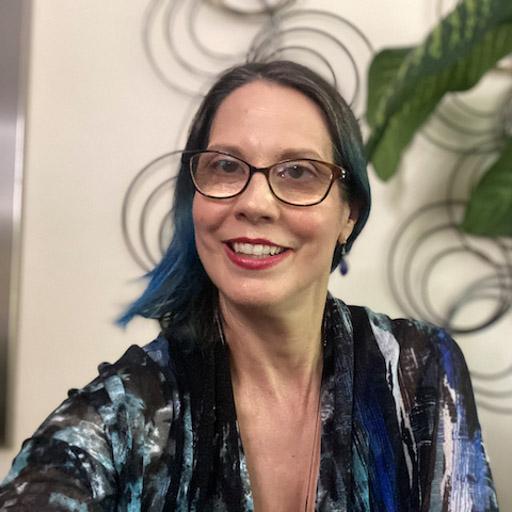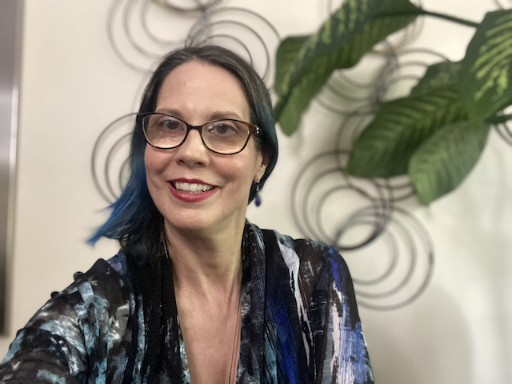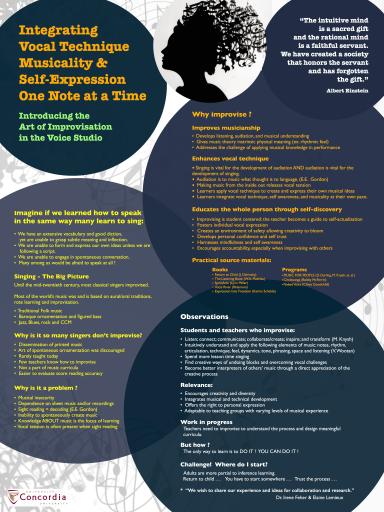
Dr. Irene M Feher, D.Mus.
- Lecturer, Music
Are you the profile owner?
Sign in to editResearch areas: Singing, Vocal Pedagogy, Music Education, Improvisation
Contact information
Email:
Availability:
Website:
Biography
Contact email
irene.feher@concordia.ca
Biography
Dr. Irene Feher, mezzo-soprano and versatile vocalist is a devoted pedagogue and performer. Irene has a private voice studio in Montreal where she teaches CCM (rock/pop/R&B), Classical and Musical Theatre singing. She also teaches classical/contemporary voice at Concordia University and Vocal Techniques at McGill's faculty of music education. A member of NATS (National Association of Teachers of Singing) since 2003, Irene continues to fuel her passion for teaching voice by keeping up to date on the latest research in vocal instruction. In July 2021 she will attend University of Shenandoah’s CCM Vocal Pedagogy Institute, where she will refine her skills teaching rock/pop/R&B voice. Her own research focuses on vocal improvisation and its use in vocal instruction. Irene presented a poster paper on the subject at the 54th NATS Conference in Chicago in July 2016, and she is currently offering vocal improvisation classes online: https://www.livingyourmusic.com/eusing
With over 27 years of teaching experience and a passion for healthy vocal production, Irene combines her discipline as a classically trained singer with her knowledge of vocal function exercises, somatic awareness, and improvisation to create a holistic program of vocal study that is catered to each person she works with.
Irene is dedicated to supporting musicians' wellness. She studied Musician's Wellness with Dr. Louise Montello (New York) and continues her own daily practice of meditation and yoga. Irene is a member of the teaching staff of Music for People (www.musicforpeople.org), where she facilitates vocal improvisation.
When Irene is not singing or teaching singing, she is bringing the joy of music collaboration to the community at large. With a firm belief that everyone is full of music, Irene facilitates music learning through free improvisation workshops including the “Live Your Music at Concordia” Project.
Irene performs locally for charities and audiences who are unable to get out and enjoy concerts. With a vast repertoire of songs, Irene has performed concerts featuring the music of Gustav Mahler, Franz Schubert, Arthur Honegger, Georges Bizet, Cole Porter, Stephen Sondheim, Richard Rodgers, Jim Cuddy and Carol King.
She completed her doctoral degree at The Schulich School of Music/McGill University where she was awarded the coveted SSHRC fellowship for her research in the use of spectrographic analysis as a visual aid for teaching lyric diction, which she presented at the Third International Physiology and Acoustics of Singing Conference in York, England. For her doctoral thesis she analyzed and performed songs by the Austrian composer Erich Wolfgang Korngold. Irene studied 'Poetry and Performance of the German Lied' at the Franz-Schubert-Institute in Austria where she worked with internationally renowned artists Elly Ameling, Helmut Deutsch, Jorma Hynninen, Rudolf Jansen, Christoph Prègardien, and Edith Wiens. She studied voice with such respected teachers as Norma Newton (New York), Winston Purdy, and Beverly McGuire (Concordia University, Montreal). She also received extensive repertoire coaching from Michael McMahon and Dr. Jennifer Matthews.

Irene Feher
MCM Photo - Mario C Melillo
Teaching activities
Concordia University - Department of Music - Private Study Classical/Contemporary Voice
I have been teaching Private Study for Concordia's Department of Music since 2009. As a proud alumnus of Concordia's Fine Arts Specialization in Music Performance Program, I appreciate how our Department continues to support students with diverse musical backgrounds and goals. Concordia prepared me well for my graduate studies in music.
PRIVATE STUDY – Voice Classical/Contemporary
(MPER.251/351/252/352/451/452, MPER390/490)
COURSE DESCRIPTION
The course covers technical and interpretive aspects of voice performance. Technical skills based in the tradition of western classical singing pedagogy are acquired through practical instruction and feedback in lessons aimed at helping students develop strategies that they will use in their daily individual practice of vocal exercises, improvisation, and preparation of repertoire for performance.
COURSE OBJECTIVES
To develop:
· An approach to professional-level singing that is healthy and artistic
· A sound and reliable technique based in the tradition of western classical singing pedagogy (aligned posture, breathing, balanced phonation and lyric diction)
· Efficient use of practice time
· Mastery of vocal exercises to develop breath control, pitch accuracy, flexibility, a focused tone, extended vocal range, and lyric diction
· Application of technique in preparation of vocal repertoire
· Musicianship, and audiation through improvisation
· Score reading and memorization skills
· Knowledge of the performance practice of different styles and periods that are relevant to the genre of song being studied
· The ability to sing in at least two languages that are relevant to the vocal genre being studied with good lyric diction
· Musical and interpretive skills
· Stage comportment and presence
McGill University - Faculty of Music Education - Vocal Techniques
Course Content and Methodology: through assigned readings, in-class participation, demonstrationsand discussions, students are introduced to the physiological, acoustic andpsychological principles underlying healthy and musical singing. Students aretested on their theoretical knowledge of standard vocal terminology andconcepts to ensure that as future educators they have sufficient knowledge to communicateideas, and access and use valuable resources for vocal instruction. Studentsapply what they learn as they sing in class and choral lab, and engage inpersonal home practice. Theoretical topics covered include: principles of skillacquisition (teaching and learning howas opposed to what); posture and breathing;proper phonation; resonance and perception of self and others; vocalregistration and range extension; articulation including lyric diction forsingers and the International Phonetic Alphabet (IPA); attributes of adult maleand female voices; children’s voices; and, voice change during adolescence. Thefollowing aspects of vocal pedagogy are practiced in class: vocal techniquesand warm ups; vocal improvisation; vocal hygiene; developing a resonantspeaking voice; demonstrating and directing vocal warm ups and activities; preparingand singing a song; developing basic diagnostic skills to overcome challengesfound in repertoire; and working with poor pitch singers.
Summer Workshop - Uniting Body, Mind, and Voice in Performance Bridging Vocal Technique and Creative Expression Through Improvisation
These workshops are designed for more advanced singers who wish to expand their creative potential. I give these workshops with well-known Montreal pianist and fellow improviser Josee Allard.
Workshops allow singers to:
![]() Explore and expand presentvocal abilities
Explore and expand presentvocal abilities
![]() Practice expressivemovement that is inspired by intention and music
Practice expressivemovement that is inspired by intention and music
![]() Listen more deeply andcultivate existing innate musicality
Listen more deeply andcultivate existing innate musicality
![]() Discover what it is tosing with intention
Discover what it is tosing with intention
![]() Sing with more confidenceand self-reliance
Sing with more confidenceand self-reliance
![]() Mindfully interact and makemusic with others
Mindfully interact and makemusic with others
![]() Use improvisation tofurther develop musicianship skills
Use improvisation tofurther develop musicianship skills
We are born all artists - the challenge is remainingone as we grow up.
PabloPicasso
The aim of this workshop is to allowsingers to explore the process behind expressive and technically sound vocalperformance. This is achieved through exercises that combine movement and vocalimprovisation. Vocal improvisation provides the time, space and freedom thatenables participants to: focus on, explore and expand their singing abilities;develop awareness of how they use their entire body or “instrument” as theyperform; and, learn about mindful, focused listening and the power of intention.As participants begin to use their intuition, senses, and instincts to makemusic in the moment, they gain musical insights that enhance score reading androle preparation. Improvising with others as part of an ensemble also enhancesself-confidence, group synergy and stage presence. As they learn to trustthemselves, singers begin to communicate more effectively and sing with anempowering sense of self-reliance. Here is the bonus: vocal improvisation canbe really fun.
My holistic approach is built upon study ofthe art of improvisation as taught by Music For People (David Darling, Mary Knysh,et. al musicforpeople,org), vocology (the science and habilitation of thesinging voice), motor skill development through somatology, and PerformanceWellness (Dr. Louise Montello).
FrequentlyAsked Questions:
Is it true that anyone can learn how toimprovise? Yes, what most of us lack is experience due to a lack of exposure tothe practice.
Can improvising interfere with vocaltechnique? At first, it may feel like it does, but singers quickly discoverthat improvisation enhances vocal technique. Improvisation develops deep inner listening(audiation), an essential part of vocal technique that is often overlooked(think about how you sing in ear training classes and how that differs from theway you sing in lessons and concerts…). Improvisation allows you to explore and practice vocal technique and preparewritten music at your own pace.
Isn’t improvising with a group of singers ascary experience? Yes, it can be at first, but once you realize there are “nowrong notes” you will experience how liberating empowering and creative it canbe. Improvising with others also teaches you how to listen to, and interactwith others. This kind of musical communication builds group synergy andteamwork.
Can I practice improvisation on my own?Absolutely! You will be provided with ideas that you can take home and playwith.
Music for People - Workshops and Trainings
https://www.musicforpeople.org/wp/
Creative musical play promotes personal expression and well-being. Learn free improvisation to unlock your creativity and improve musicianship and listening skills. MfP's form of free improvisation promotes mindfulness through music.
TRAINING OPTION FOR MUSIC EDUCATORS AND MUSIC THERAPISTS: OPENING THE WAY FOR ALL TO PLAY
Private Group Classes - EuSing!
These interactive vocal improvisation workshops allow participants to explore their range of vocal expression and improve overall vocal ability. This is achieved through improvisation, movement, breathing exercises and percussion. They are open to everyone, yes everyone can sing, there are just people who have had less experience than others.
Research activities
Integrating Vocal Technique, Musicality and Self Expression One Note at a Time - Introducing the Art of Improvisation in the Voice Studio
Poster presentation for NATS 2016 NationalConference, Chicago
Dr. Irene Feher (DMus)
Elaine Lemieux
Integrating Vocal Technique,Musicality and Self Expression One Note at a Time
Introducing the Art ofImprovisation in the Voice Studio
The College Music Society (CMS) recently published on its website atask-force report entitled “Transforming Music Study from its Foundations: AManifesto for Progressive Change in the Undergraduate Preparation for MusicMajors.” In an effort to further students’ potential for professionalparticipation and leadership in today’s rapidly evolving musical culture, thetask force created a detailed rationale and list of recommendations that centeraround creativity, diversity and integration. This poster presentation addressesand supports one of the key points put forth by the task force: integrating improvisationinto today’s music curricula provides a stronger basis for educating musicianstoday than the prevailing model of training performers solely in the interpretationof existing works. More specifically, the question of how voice teachers canintegrate improvisation in studio lessons is explored in depth.
Many students oftenfeel blocked and frustrated when they conscientiously try to use vocaltechnique to sing expressively in the voice studio and on stage. Canimprovisation be used as a means to address this challenge? Can creativeexpression through improvisation enhance technical development, overallmusicianship, sight-reading ability, interpretation, and stage presence? Whatresources are available to teachers who are interested in exploring thesequestions? The authors’ experiences of integrating (and in some instancesadapting) into daily singing practice and teaching the materials created overthe last thirty years by teachers and members of Music for People (founded in1986 by cellist David Darling and flutist Bonnie Insull) suggest thatimprovisation, when practiced regularly, is a powerful learning activity. It requiresintense application of musicianship and communication skills, which in turnenhances vocal performance, as well as overall personal development.
The poster presentationwill feature a brief overview of the history of improvisation in singing; possiblecauses for its noticeable absence in today’s music curricula; a more detailed listof the skills that are used and thus developed during improvisation such asaudiation, pre-phonatory tuning, motor ability, concentration and selfawareness; sight reading, and for those who wish to try, experiential examplesof some of MfP’s basic improvisation exercises; suggestions on how to initiateand facilitate improvisation activities; and finally, a list of resources thatteachers can consult if they wish to further explore the art of improvisation, and/orcreate a course of practical study for one-on-one lessons and group classes.
Growinginterest in undergraduate and graduate programs in CCM and musical theatre makethis an even more relevant consideration in curriculum development. The aim isto open a dialogue on this subject and develop ideas for further research.

POSTER PAPER
IRENE FEHER & ELAINE LEMIEUX
Publications
Sing a Different Tune and Improvise! There Are “No Wrong Notes” and No “Poor Pitch Singers”
Connections - The Newsletter of Music For People. Fall 2015
A Voice Teacher Sings Out for the Art of Improvisation (AOI)
Article in Connections - The Newsletter of Music for People. Spring 2014.
Erich Wolfgang Korngold: Between the Notes - Three Song Cycles to His Beloved Father
Doctoral Thesis - McGill University (2009)
Visual feedback for the practical instruction of articulatory and acoustic phonetics as an adjunct to lyric diction courses.
Presented at the Physiology and Acoustics Conference, York, England. (2006)
Abstract
“Cantare come si parla” is a classicpedagogical phrase that raises an important question: how do we speak? If askedto explain how the sound of the letter “d” is physically produced, most peoplewould be at a loss. The main reason for this is that we acquire speech in aninstinctive and imitative manner so we are not accustomed to thinking of it interms of physical action and complex sound. This can pose problems fordeveloping singers who are learning lyric diction because articulation caninterfere with voice production. A possible solution is to design a systematicapproach that combines the study of articulatory phonetics, how phonemes areproduced, with that of acoustic phonetics. Acoustic phonetics is the study ofthe resonances of the vocal tract that is carried out with the aid ofspectrographic analysis. In this context spectrography would serve as the idealvisual learning aide to help singers become kinaesthetically aware of vocaltract resonance and therefore develop diction that is not only intelligible butphysiologically more compatible with the singing voice.
The subjects, voice performance majorsenrolled at McGill University, Montreal, will receive five hours of individualinstruction with spectrographic analysis (VoceVista). Data will be collected inthe form of pre- and post-test recordings which will be assessed by a panel ofjudges in a blind test, and evaluation questionnaires that will be filled outby the subjects. A control group will also be recorded in order to provide apoint of reference. The forecast result is that the students in the test groupwill demonstrate a comparatively higher rate of progress than those in thecontrol group. This study is an attempt to adapt vocal pedagogy to today’slearning environment by using technology in a context where it can serve tocompliment traditional teaching methods.
Participation activities
LIVING YOUR MUSIC: IMPROVISATION WORKSHOPS
In May 2016, Irene Feher co-facilitated four improvisation workshops with Mary Knysh (musicforpeople.org and rhythmconnections.com)
Artistic performances
This Thing Called Love - Songs of Cole Porter
Musical co-written and arranged by Larry Lamont & Nancy Berman
Recital of Songs and Duets
Irene Feher, mezzo soprano
Colleen Bartely, soprano
Linda Brady, piano
Christ Church Cathedral, Montreal, Thursday May 26th at 7PM.
Works by Mozart, Brahms, Mendelssohn, Fauré, Dvořák, Honegger, Britten, and Bolcom


